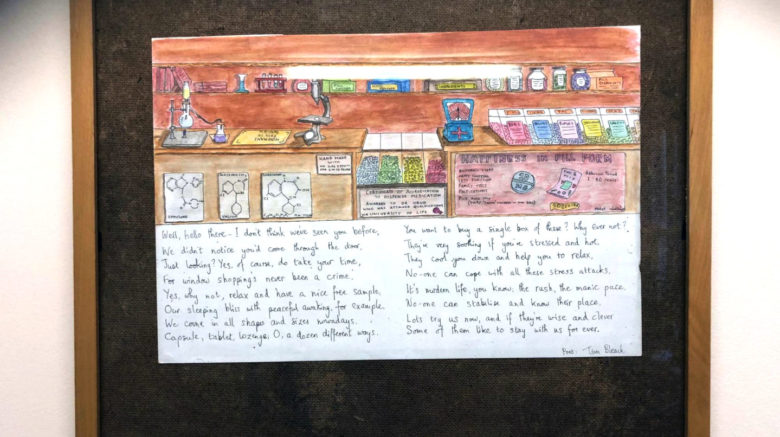As a service user of the REST project at Mind in Camden, I want to celebrate World Benzodiazepine Day 2018 by telling the world a little bit about what REST has done for me, and for the thousands of others it has supported since it began in 1988.
REST is a support service for people who are physically dependent on benzodiazepines and sleeping tablets. It has just three staff members and runs on a budget of less than £50,000 annually, and it supports about 145 people a year. I’m one of those.
I have no memory of contacting REST when I was in cold-turkey withdrawal from a range of benzodiazepine drugs roughly three years ago. The benzos have wiped much of my memory from that time.
For the previous 4 years, I had been prescribed diazepam, clonazepam, and zolpidem by a private doctor. But the doctor never helped me, so I decided to stop seeing him — and my prescriptions stopped, too.
For months, I hardly slept a wink. Every day I walked the streets of London in a futile effort to tire myself out. I felt trapped and anxious, pacing about in limbo, unable to work, see friends or face the world.
At first, I didn’t understand I was in benzo withdrawal — I thought it was something wrong with me. But I guess I must have been googling for help because somehow, I found out about REST. It was close to where I lived.
I rang up. REST’s service manager, Melanie Davis, answered the phone, as she does on a daily basis to so many people who call for support or advice on physical benzodiazepine dependency. She invited me to REST’s weekly peer support group.

I don’t remember the first time I ever went to the REST peer support group, either! Group members tell me that the day I arrived, I was quiet and withdrawn, and virtually unrecognisable from the person I am today.
For the past three years, they’ve watched me change, heal and grow. Whenever I feel discouraged, they remind me how far I’ve come.
The group members understand what benzodiazepine withdrawal feels like. I think they understand me better than anyone else.
I’ve attended the group regularly ever since. Some members have been coming for longer than I have, others are more recent arrivals. Every time someone new comes along, group members listen to their story and ask gentle questions. How long have they been on benzos? Why did they start taking them? What is their life like now? We each tell of our own experiences in the hope they might help. How fast or slow are we tapering? What has helped us, and what has made things harder? What emotions do we struggle with? Usually, there are lots of similarities between our stories.
When I was new, group members explained to me that they tapered slowly off benzos, many of them 1mg diazepam a month. They told me to read the Ashton Manual and decide for myself what to do.
I decided to go back on diazepam (ending my period of ‘cold-turkey’ withdrawal) and taper off slowly. For this, I needed a prescription — so I needed the help of my GP. But after my ordeal, I was terrified of doctors…
So, Melanie wrote me a letter to take to my GP. Melanie writes lots of letters like this as part of REST’s advocacy services. In my letter, she wrote that I was committed to a planned withdrawal and I deserved my GP’s support. Many GPs are understandably wary of prescribing benzodiazepines, but in my case, I needed a prescription. In the envelope, Melanie included a copy of the British National Formulary and NICE guidelines for benzodiazepines.
I planned for my taper to take a year. In the end, it took 18 months. Throughout this, I had regular support from REST’s group members and, thanks to Melanie, a reliable prescription from my GP.
Now I’m 18 months off benzos, but I still attend REST regularly to process the anger and grief I feel about what I went through, and to support those who are still tapering.
Once they feel strong enough, REST service users do lots to raise awareness of the problems associated with benzodiazepines, through talks and presentations to other organisations, including community events, charities and even the staff of large corporations! A recent example is REST members Luca and Michael who set up a stall last week at a mental health fair in Calthorpe Park, Camden, giving out leaflets for W-BAD. And there are countless other examples, too.
In the past 3 years, I’ve given talks about my experience to organisations such as Fibromyalgia UK, the Royal College of GPs, and at events such as a St Mungo’s festival for Mental Health Awareness Week 2016. Opportunities gained by virtue of being a REST member allowed me to build my confidence and give something back, so they were an important part of my recovery.
Melanie Davis raises awareness by contributing to high profile forums such as the APPG on Prescribed Drug Dependence at the House of Commons, and the British Medical Association roundtable. As you can see, REST staff and service users are raising ‘Benzodiazepine Awareness’ all year round.
Sadly, REST’s future at Mind in Camden is uncertain, and the same seems to be true for the handful of benzo services that exist in the UK.
For a more detailed picture of the situation in the UK for benzodiazepine support services, including REST, I recommend Beverley Thorpe’s recent article.
You can also learn more about REST’s situation and benzodiazepine prescribing in the UK in Harry Shapiro’s article on the Drugwise website.















So you were fucked over good and proper by a private doctor and now your being used by these people to chug more money to try and keep them going. It’s not good you know.
Never mind, Mind in Camden,Royal College of GP’s Harry shapiro and the rest, you should be asking how do we make these ‘doctors’ – who put you on these dugs – accountable for the crime they committed against you. If a few of these people got banged up and their pay packets handed over to you for seriously destroying yours and countless other lives you can bet a whole heap of ‘doctors’ will not be prescribing this incentivised destruction.
Prescribing benzos and then just not only turning their backs on patients but blaming them for the situation they are in needs to be seen for what it really is: a serious crime against humanity.
Report comment
That’s great. I’m glad for you that you had courage to give them a dial.
Report comment
Dear Lucy,
Thanks for your informative Article.
The UK spends over £100 million on research into (mostly) chemical solutions for “Severe Mental Illness”. I believe this money could be better spent.
When I complained about disabling “medication” sideffects, and my Psychiatrist wasn’t able to do anything about this, I was given the option of abrupt withdrawal from the “medication”.
This option didn’t work for me. But a careful drug taper did.
The withdrawal anxiety I experienced when I eventually discontinued, stayed with me for quite a while after. I asked MIND for help at the time, and they provided me with trainee counsellors, who were very helpful.
My parting Psychiatric Diagnosis was as SEVERE as would be possible. But I recovered with the help of basic Psychotherapy.
Coming off strong psychiatric drugs meant an End to Psychiatric Disability; and an End to Taxpayer Cost (for many years now).
Report comment
That could have been my story, except I experienced the same thing from anti-p withdrawal. I didn’t sleep! I cannot believe I went five years in that nether world between sleep and wakefulness due to the worst insomnia I have ever had. I, too, was terrified of doctors after what I had been through, so I would not go to one.
I figured the best thing to do, the sensible thing, was to reinstate. I got drugs illegally and then, tapered. Slowly. I couldn’t tell you how long I have been tapering since the reinstatement. Seroquel was impossible to taper from but Thorazine is reasonable, much easier, and switching from one to the other was a snap. I stopped totally but then, reinstated an even tinier sliver. I believe the tiniest I can get the slivers is about 3mg. Thorazine dosing goes up to 2,000mgs, so that gives you an estimate of how much I have managed to go down on it. If I ever have to get a prescription I’d go out of state and pay cash, no insurance.
Report comment
As an ex consumer I don’t have any difficulty understanding the cutting down to 3mg of a drug that can be consumed at 2000 mg per day – but I think this would be beyond most doctors understanding.
Seroquels properties guarantee dreadful insomnia on discontinuation which is likely to guarantee Seroquel dependency.
Report comment
Yes I am positive the anti-p’s caused the insomnia. For a time I was on 900 of Seroquel and also I was on three anti-p’s simultaneously at highest doses possible. This wrecked my ability to sleep and I am still recovering. Tell a doctor and 99% don’t believe me.
Report comment
I was regularly taking 6mg of Seroquel (1/4 of a 25mg tablet)/per night; and when I stopped taking this, my sleeping dropped from 7 hrs to 4 hrs per night.
Report comment
I couldn’t lower the Seroquel at all, in fact I went from 25 to 75 and stayed there. This is why I switched to Thorazine.
Just a hint: 75 mg of Seroquel is the equivalent of 100 mgs Thorazine. You should be able to substitute gradually and switch over. It took me a few days to switch. I went to a shrink site where I found a table on switching. So….Had I gone to a shrink they would have accessed the exact same table and done the switch just like I did.
Now I ask…Does it really take an advanced degree to find a table in a search and follow the table? Nope.
Report comment
Seroquel at 75 mg has the effect of an antihistamine. Seroquel only begins to work on the dopamine system at 150mg.
Anyway, I got around the sleeping problem and have been off all drugs for years now.
Report comment
I think a person can expect their body to go out of synch once they stop all drugs – as the liver has nothing to chew on.
Report comment
Exactly. I didn’t want the weight gain and diabetes. I must say, though, that antihistimines didn’t do anything for me for sleep. Neither did benzos or sleeping pills. Only anti-p drugs worked and only at lowest doses.
Report comment